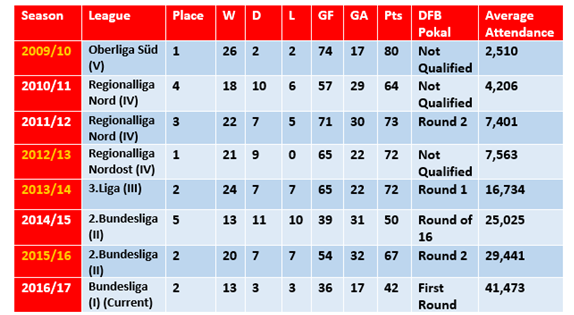Modern football and eccentric owners go together like Tony Pulis and white trainers, seems trendy at first but never quite feels comfortable. Nonetheless, a new type of ownership has recently emerged that is unlike any other, and it has been viciously disputed.
On the 12th of May 2009, energy drink powerhouse Red Bull GMBH purchased the rights to fifth division German football club SSV Markranstädt. Burdened with nothing short of astronomical expectations, RasenBallsport Leipzig were formed.
This was the first time a private company had owned a football club in Germany – and the rules were strict. The German football association would not allow ‘Red Bull’ to be used in a title, hence the use of RasenBall which translates to Lawn Ball, abbreviated – RB
Interestingly, this isn’t the first time Red Bull have owned a football club. FC Red Bull Salzburg, the New York Red Bulls, Red Bull Brazil and Red Bull Ghana were all previous outings, claiming various degrees of success.
Salzburg’s takeover was completed in 2005 and seven of the club’s ten Austrian Bundesliga titles have been earnt since then, prompting the brand to take the next step and try to conquer the leagues German counterpart.
After buying the club and renaming it, the seven founding members (all either employees or agents of Red Bull) which include Chairman Andreas Sadlo (a former football agent) and sporting director Joachim Krug, set their targets.
The newly formed board outlined plans for both the short and long term future of the club, with the goal of reaching the Bundesliga within the next 8 seasons – essentially a promotion every two years.
Promotion just a year after the takeover would set the tone. Three more in the next six years saw their average attendance rise from 2,500 in 09/10 to 41,473 so far this season, which shows how support and success for the Bulls has gone hand in hand. The rest of Germany, however, has not shown as much support for their countries first footballing franchise.
Somewhat unbelievably, just six years later, they briefly found themselves above the European giant that is Bayern Munich, and top of the German Bundesliga.
The key stats from each season of RB Leipzig’s existence
*Seasons in Gold ended in Promotion
From the creation of RB Leipzig, to their newly found fame at the summit of German football, there has been constant and unrelenting disapproval.
Multiple clubs have brought tiny away followings to the Red Bull Arena in a very public protest. In last week’s battle with Borussia Dortmund at the Westfalonstadion, the home fans made their opinions of the away side clear.
During the game banners were displayed in the home end that read: “Whoever loves football, hates RB.” And also: “Beer is a passion, RB only a fashion.”
However these messages of distaste were surpassed by extreme violence before the game, as Borussia Dortmund were forced to publicly condemn the behaviour of their own fans.
Dortmund fans pelted cans and stones at Leipzig supporters (including women and children) as they approached the stadium. Four police officers and a police dog were also injured. Dortmund police filed 28 charges against home fans for breaches of the law which included theft explosives, assault, damage to property and bodily injury.
This eruption of violence by a usually composed support demonstrates just how deep the hatred of Leipzig runs in German football, and despite the rags-to-riches tale of the former minnows to likely Champions League qualifiers, the voices only get louder and harsher.
In spite of several controversial events, RB are amazingly the first East German team to play in the Bundesliga since Energie Cottbus in 2009, at which point RB Leipzig had not yet been founded. The Bulls remained unbeaten for their first 13 matches in the Bundesliga, a record for newly promoted teams.
Some of the biggest opposition against the Red Bull Empire refer to the situation at another franchise – RedBull Salzburg, who have recently become a feeder club after failing to qualify for the Champions League nine times in a row.
Salzburg were even forced to transfer three of their best players to Leipzig last summer. The former public enemy in Austria are now seen as a laughing stock as they play second fiddle to the new toy that is Leipzig.
The legacy of RasenBallsport Leipzig has the potential to be vastly successful, but to do so, the owners will have to ensure previous mistakes are not repeated, and crucially, evade boredom.
Excellent explanation with supporting
Details-
LikeLike